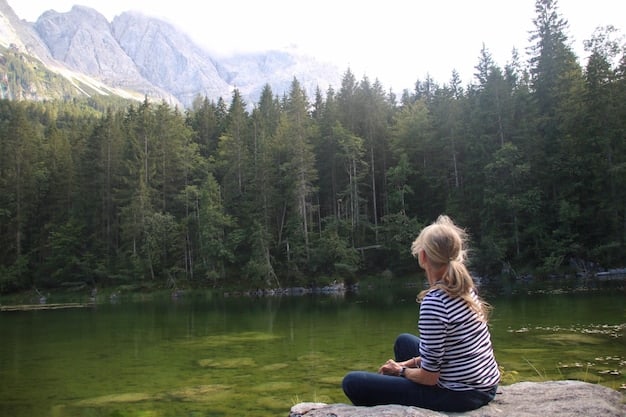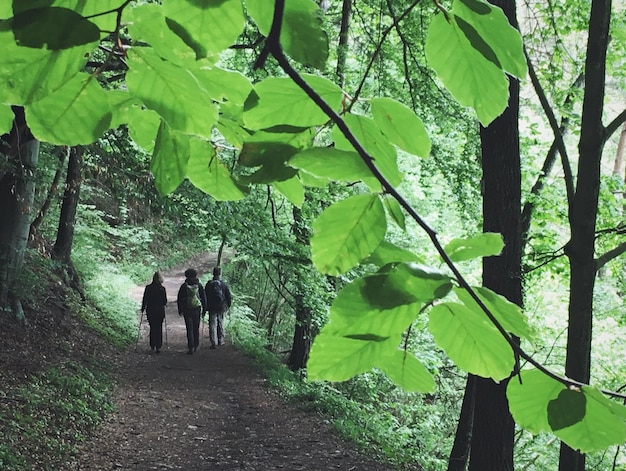The Unexpected Benefits of Nature on Stress and Well-being

Anúncios
The Unexpected Benefits of Spending Time in Nature: Reduce Stress and Improve Your Well-being are numerous, ranging from reduced stress levels and improved mood to enhanced cognitive function and increased physical activity, all contributing to a healthier and more fulfilling life.
Discover the unexpected benefits of spending time in nature: reduce stress and improve your well-being. In today’s fast-paced world, escaping to nature can feel like a distant dream, but the advantages of doing so are more profound than you might imagine.
Anúncios
Nature’s Stress-Busting Power
Spending time in nature is more than just a pleasant pastime; it’s a powerful antidote to the stresses of modern life. Discover the profound impact nature can have on your mental and emotional well-being.
Cortisol Reduction
One of the most significant benefits of being in nature is its ability to lower cortisol levels, the hormone associated with stress. Studies have shown that even short periods spent in green spaces can lead to a noticeable reduction in cortisol, promoting a sense of calm and relaxation.
Anúncios
Improved Mood
Nature has a remarkable ability to uplift our spirits and improve our mood. The fresh air, natural light, and scenic beauty can trigger the release of endorphins, natural mood boosters that leave us feeling happier and more content.
- Reduced anxiety and depression symptoms
- Increased feelings of joy and contentment
- Enhanced sense of connection with the world
Beyond the physiological benefits, being in nature also provides a mental escape from the demands of daily life. It offers a chance to disconnect from technology, clear our heads, and focus on the present moment.
Boosting Mental Clarity and Focus
In addition to reducing stress, time spent in nature can significantly enhance cognitive function. Explore how natural environments can sharpen your focus and improve your mental clarity.
Enhanced Attention Span
Studies have shown that exposure to natural environments can improve attention span and cognitive performance. Nature walks and outdoor activities can help restore our focus and reduce mental fatigue.
Creativity Boost
Nature can also spark creativity by providing a stimulating and inspiring environment. The sights, sounds, and textures of the natural world can ignite our imagination and lead to new ideas and insights. Being in nature allows our minds to wander freely, fostering a sense of openness and exploration.
- Improved problem-solving skills
- Increased innovation and creativity
- Enhanced cognitive flexibility
Furthermore, nature provides a break from the constant stimulation of urban environments, allowing our brains to rest and recharge. This mental downtime is essential for maintaining cognitive health and preventing burnout.
Ultimately, spending time in nature is not just a recreational activity; it’s an investment in our mental well-being. By incorporating regular nature breaks into our lives, we can improve our focus, boost our creativity, and enhance our overall cognitive function.
Physical Health Benefits
The benefits of spending time in nature extend beyond mental and emotional well-being to encompass physical health. Discover how connecting with the outdoors can improve your physical fitness and overall health.
Increased Physical Activity
Nature provides opportunities for physical activity, whether it’s hiking, biking, swimming, or simply walking in the park. These activities can help improve cardiovascular health, strengthen muscles, and boost overall fitness.
Vitamin D Boost
Spending time outdoors exposes us to sunlight, which is essential for vitamin D production. Vitamin D plays a crucial role in bone health, immune function, and overall well-being. Regular sun exposure can help prevent vitamin D deficiency and its associated health problems.
Engaging in outdoor activities often leads to a more active lifestyle, which can have numerous health benefits, including weight management, improved sleep, and reduced risk of chronic diseases. Additionally, the fresh air and natural surroundings can make exercise more enjoyable and sustainable.
Therefore, incorporating outdoor activities into your routine is a simple and effective way to enhance your physical health. Whether it’s a brisk walk in the park or a weekend hiking trip, the possibilities are endless.
Nature’s Role in Social Connection
Spending time in nature can also foster social connections and strengthen relationships. Discover how outdoor activities can bring people together and enhance social well-being.
Shared Experiences
Outdoor activities often involve shared experiences, such as hiking, camping, or picnicking with friends and family. These shared experiences can create lasting memories and strengthen bonds.
Community Building
Nature-based activities can also foster a sense of community and belonging. Joining a hiking club, volunteering for a conservation project, or participating in a community garden can connect you with like-minded individuals and create a sense of shared purpose.
- Enhanced communication and cooperation
- Increased empathy and understanding
- Strengthened social support networks
Interacting with others in natural settings can promote positive social interactions and reduce feelings of loneliness and isolation. The shared appreciation for nature can serve as a common ground, fostering a sense of connection and camaraderie.
In conclusion, nature plays a vital role in fostering social connections and enhancing our overall well-being. By engaging in outdoor activities with others, we can strengthen relationships, build communities, and promote a sense of belonging.
Tips for Incorporating Nature into Your Routine
It’s easy to get caught up in the demands of daily life and forget to prioritize time in nature. Here are some practical tips for incorporating nature into your routine.
Schedule Regular Nature Breaks
Make time for nature in your calendar, just like any other important appointment. Whether it’s a 30-minute walk in the park during your lunch break or a weekend hiking trip, scheduling regular nature breaks will help you prioritize your well-being.
Find Green Spaces Near You
Explore the parks, gardens, and natural areas in your neighborhood. Even small pockets of nature can provide significant benefits. Identify the green spaces that are easily accessible to you and make a point to visit them regularly.
Consider incorporating nature into your daily commute by walking or biking instead of driving. Even a short walk through a park or a tree-lined street can provide a much-needed dose of nature. Moreover, introducing natural elements into workplace can contribute to employees’ well-being. Ensure that windows that workers can look out of, even if all they can see is a small patch of green.
By incorporating these simple strategies into your life, you can make nature a regular part of your routine and reap its numerous benefits. Even small amounts of time spent outdoors can have a profound impact on your well-being.
Overcoming Barriers to Nature Exposure
While the benefits of spending time in nature are clear, many people face barriers that prevent them from accessing natural environments. Let’s explore some of these barriers and strategies for overcoming them.
Time Constraints
One of the most common barriers is lack of time. Many people feel overwhelmed with work, family, and other commitments, leaving little time for outdoor activities. To overcome this, try to integrate nature into your existing routine, such as walking to work or eating lunch in a park. Even a few minutes of exposure to nature can make a difference.
Accessibility Issues
Geographical or physical accessibility can be a significant barrier for some individuals. They may not have access to nearby parks or natural areas, or they may have mobility issues that make it difficult to participate in outdoor activities. To address this, check out community programs that cater to special needs.
- Advocate for more green spaces in your community
- Explore virtual nature experiences
- Create a nature-rich environment at home
Despite the challenges, there are many ways to overcome barriers to nature exposure, or ways to still enjoy the benefits even when nature contact is unattainable. By addressing these challenges and finding creative solutions, everyone can experience the transformative power of nature.
| Key Point | Brief Description |
|---|---|
| 🌿 Stress Reduction | Lowers cortisol and promotes relaxation. |
| 🧠 Mental Clarity | Enhances focus and boosts creativity. |
| 💪 Physical Health | Increases physical activity and Vitamin D. |
| 🤝 Social Connection | Fosters relationships and community. |
Frequently Asked Questions
▼
Studies suggest that even as little as 20 minutes of being in nature can significantly reduce stress levels and improve mood. Aim for regular short visits to natural settings.
▼
If access to parks or forests is limited, create a nature-rich environment at home with plants, natural light, and calming nature imagery. Even a small indoor garden can help!
▼
While not the same as being physically present in nature, virtual nature experiences can still offer some stress relief and mental stimulation. Try nature documentaries or virtual tours.
▼
Consider hiking, trail running, cycling, swimming, or simply taking a walk in a park. These activities combine physical exercise with the calming effects of nature, maximizing the benefits.
▼
Exposure to natural light during the day helps regulate your body’s natural sleep-wake cycle. Spending time in nature can improve sleep quality by reducing stress and promoting relaxation.
Conclusion
Incorporating time in nature into your daily routine offers a multitude of unexpected benefits for your stress levels and overall well-being. From reducing cortisol and boosting mental clarity to enhancing physical health and fostering social connections, nature has a transformative power that can enrich your life in countless ways, making it a worthwhile investment in your health.







